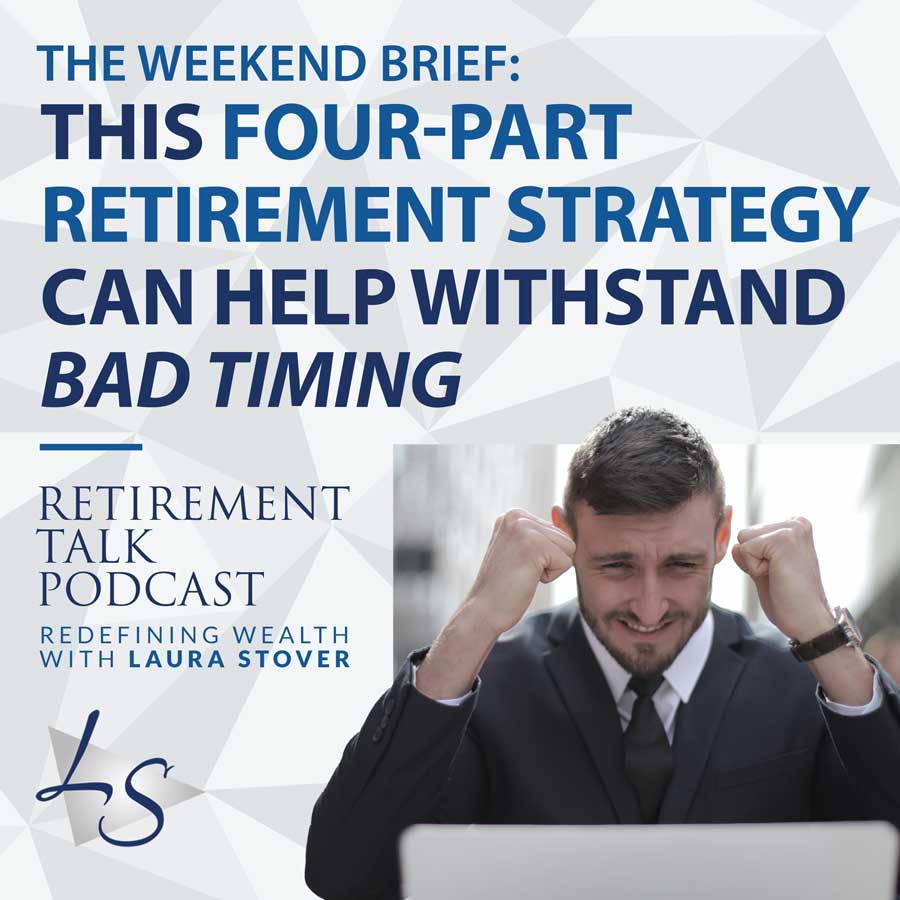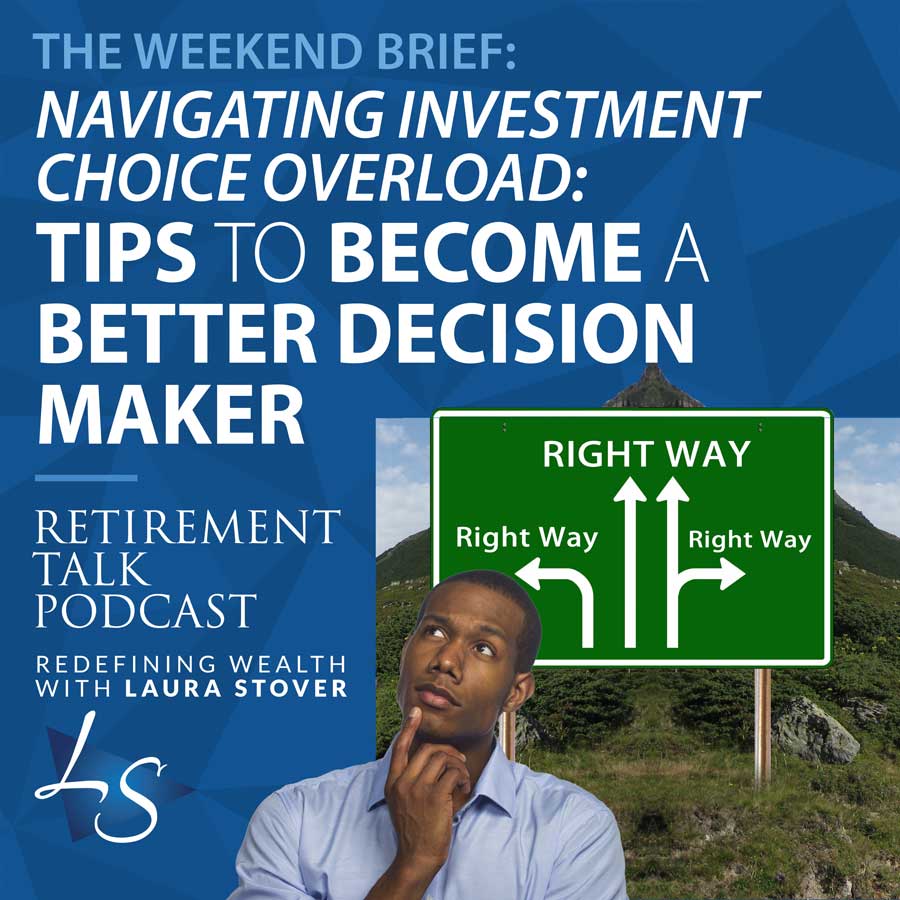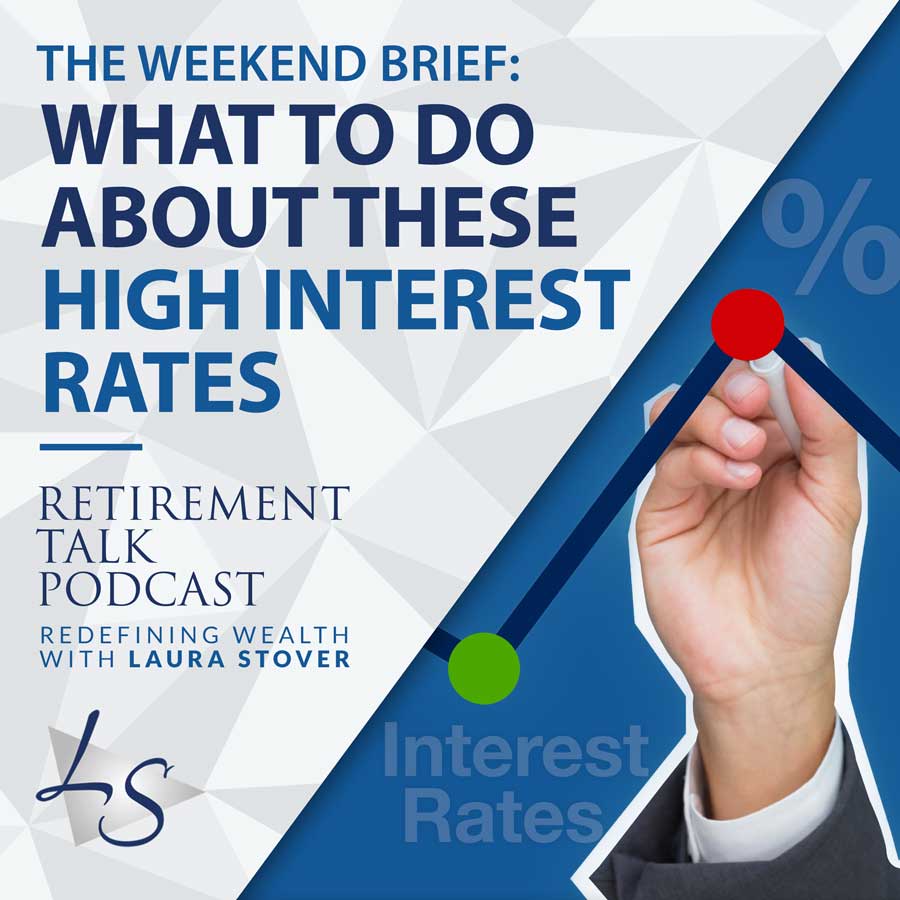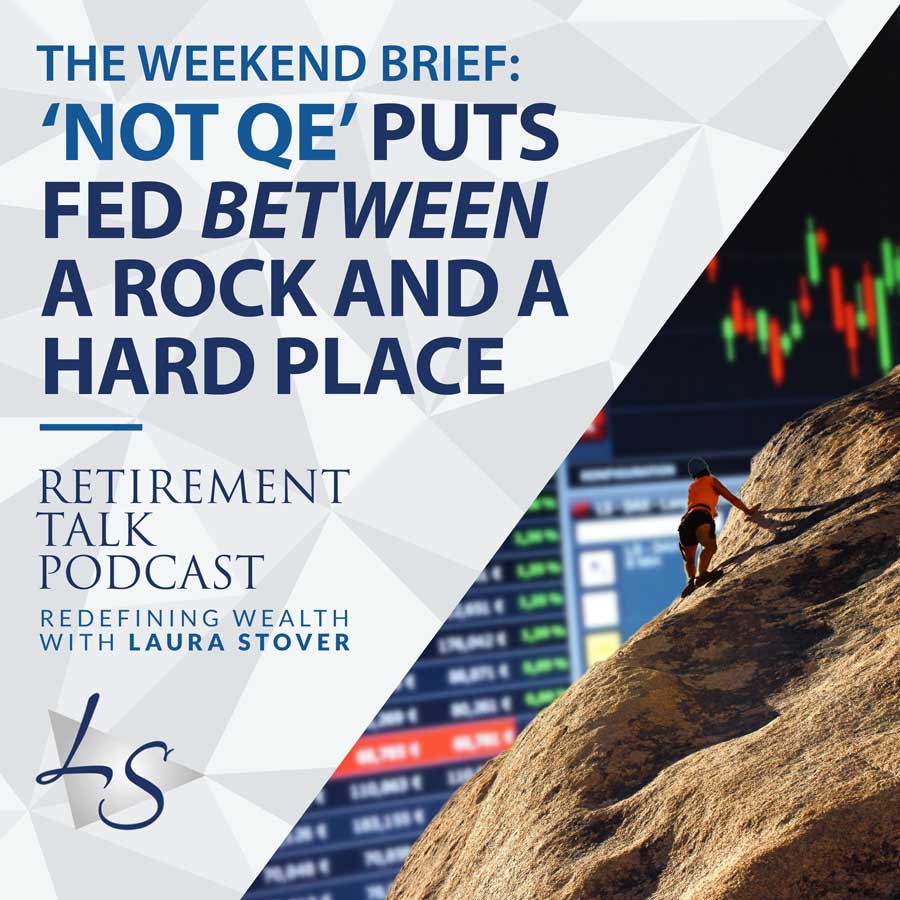Everyone has worries in life, especially when it comes to money. Does money have the power to change your life? It certainly can take care of our basic necessities. However, worrying too much can lead to questionable decision-making and unhealthy levels of stress. An obsession with your bank account may be a sign of deeper anxieties that money can’t solve. If you feel this way you are not alone, especially in today’s world.
People may react to returns in their portfolio by taking on more risk. But is this wise? It really depends on where you are in your retirement planning journey. Perhaps you had a bad experience in the market and now you are a conservative investor. Do you really know how much risk you are taking on though? We want to avoid making those emotional decisions when we can, that’s why having a financial advisor is so important. On today’s episode, join us as we discuss the correlation between money, happiness, and our financial future.
Review the article mentioned in today’s show >>
Rate & Review the Podcast:
https://podcasts.apple.com/us/podcast/retirement-talk-podcast-with-laura-stover/id571347188
LINKS
Schedule a Review: https://redefiningwealth.info/schedule/
TIMESTAMPS (SHOW NOTES)
1:31 – Are you worried about money?
6:34 – Why taking on more risk may be dangerous.
11:11 – What does it mean to be a conservative investor?
15:19 – Money helps us meet our survival needs.
21:44 – Basing happiness off of your bank account.
24:35 – When are fees worth their value?
Listen & Subscribe
Review the Transcript:
Ron:
Welcome to Retirement Talk, the redefining wealth ship. Your source for financial information for pre-retirees and retirees. We’re here to help you better navigate during these economic times. We’re here to discuss thoughts and ideas in the field of finance and retirement, as well as discuss trending topics. And the impact of major legislation that could impact your retirement. We will break it all down. These discussions can help you make better-informed decisions so you can live the lifestyle you imagine and make better financial choices. Laura Stover is a registered financial consultant and CEO of LS Wealth Management, as well as founder and owner of LS Tax, a consulting firm. She’s been featured in Forbes, CNBC, and The Wall Street Journal. I’m [Ron Stutz 00:00:56]. Our topic for today is what you’re really worried about when you’re worried about money. Now, here are your hosts, Laura Stover and certified financial planner, [Michael Whalen 00:01:06].
Laura Stover:
Hello. Hello. Hello. There are financial planners, then there are financial planners, and no one, and I mean, no one has the wisdom or experience. And I know a few smart ones and I’ll say, Michael, great to have you back this week. And you are my favorite certified financial planner. How are you doing, Michael?
Michael:
I am doing great. I thought my mom was given that intro there for a minute. I’m certainly glad to be back with you this week, Laura, and hated to be out for the last couple of weeks, but glad to be back in the [saddle 00:01:43].
Laura Stover:
Well, our featured article from this week is from The Atlantic. And I did a rather technical show last time with my [feeling 00:01:53] cohost [Ron Stutz 00:01:55], who is [stellar 00:01:56]. He’s part of the show here. You noticed his beautiful voice on the intro before we come in. And Ron and I had a very robust discussion last week about market volatility, the fed rate hikes, the quantitative easing because of the reduction of bond purchases, and really what to anticipate in 2022 in terms of investment trends. And if you want to get a copy of that show and you’re listening today, it was very insightful for the year ahead. If you have questions about volatility, go back and check out episode 87. You can hop on over to redefiningwealth.info for archives of all of the shows or go to wherever you hear us on Apple or Spotify, Alexa, there’s all, any platform you can imagine we should be there.
Laura Stover:
So today’s discussion, Michael, I think is a refreshing down-to-earth discussion for our listeners based on this article. And I believe sometimes the conversations really need to be simple. And how does it impact because how does it impact this as people, everyone has worries in life. Now I am blessed, week to week things come up, but I don’t think other than the pandemic. And there’s a lot of people, very worried, some don’t care, they’re going to live their life, but I do think it’s a more stressful time as a whole. You always have the exceptions out there, but I think as a whole, it’s a more stressful time for individuals, whether it’s health, life, relationships, and probably the only thing as important as those topics is the topic of money in terms of worries that people may have. And if you survey most people, the question this article poses is does money truly have the power to elevate your life?
Laura Stover:
Does money truly have the power to elevate your life? It certainly can take care of the most basic necessities. And we know with this 7% inflation, we’re not going to start hitting political aspects of this. We want the life impact, but that inflation, yes, I’m [feeling 00:04:10] it. Everybody’s [feeling 00:04:12] the inflation. But when we look at Maslow’s hierarchy of needs, if you haven’t heard of that before, it’s basically that pyramid of needs that we all have for food, shelter, and so on, and so forth. Money certainly has a limit on the amount of happiness it creates. And once you’ve met most of those basic needs, an obsession with your bank account may be hiding deeper anxieties.
Michael:
It’s very interesting on this topic because as we look at a lot of businesses, you see operational resilience. We hear that word a lot, but I think it also applies down to individuals, and there’s operations of your life, there’s different functions of your life. And then what level of resilience, you talk about the pandemic, one of the biggest issues that companies have had has been the resilience of employees going back to work, it’s operational resilience. And for individuals, as you stated, one of the biggest areas is money. And as we look at it, money is one of the things Americans worry about most in the world. And even in 2018, Laura, when the economy was expanding, everybody was looking at almost kind of the expansion that we saw in the 80s where all this growth was happening.
Michael:
Expansion of the markets were happening and consumer confidence was approaching all-time highs. There was a survey by life insurance company, Northwestern Mutual that found that more than half over 50% of Americans felt anxious or insecure about money sometimes quite often or all the time. That was really the three different degrees they looked at is it, sometimes are you worrying about money or insecure about it [inaudible 00:06:02] do you find yourself often, or is it all the time? And during the pandemic, another survey found that workers were almost five times more likely to worry about money than their health. As we saw companies being contracted and people starting to work from home, we saw layoffs that were happening. People were having to invade their retirement accounts or their bank accounts. They were truly displaying a discomfort and a lack of resilience against that operational change in their personal lives.
Laura Stover:
Well, it’s quite interesting. And indeed, I think, the pandemic, everyone’s so sick of it. There’s one thing we can all agree on. We all have to be so over it, but we’re not over it because there’s many people still getting sick. But I saw on Fox Business, recently, a report came out 55% of workers want to continue working from home. So it is definitely changing the landscape of how we interact with one another and how we do things. And I think it’s about perception to some degree. And when we’re looking at our, when we worry about money, it’s not necessarily a reflection of if your basic needs are being met, but in fact, it has alluded to in this article that it is an anxiety that reflects deeper concerns that money can’t solve and kind of flipping that perception because perception is if you have anxiety, it’s your perception about something, in my view, that, and I’m not a doctor, but that creates the anxiety, so people perceive things with their investments.
Laura Stover:
And we were speaking before we went on air today, you had a client, a sizable investment account, and this probably applies to many people. The discussion was, I want to take a little more risk with my account. The 2021 year ended up [what over 00:08:05] 27%, 28% with the S and P. So people will look at the numbers. Then they will look at their statements. They determine in their mind if they’re being successful by looking at the numbers only. And why is that a flaw? She didn’t know what she didn’t know. So she tells you, she wants to take more risk to have better returns, put that into perspective, and how there was really a disconnect there with what she thought she wanted.
Michael:
Absolutely. Well, one of the things that we do through LS Wealth in following our process is that we want to make sure that people begin with the end in mind. Do you have a comprehensive plan that holistically looks at all the areas of your life? And so once you take all of those puzzle pieces, so to say, and you put them together, you have a really good idea of what in the highest probability your retirement is going to look like. But what happens as individuals start receiving information, they start receiving anxiety, they start breaking the puzzle piece apart, and then they start fragmenting elements of the puzzle and then taking that fragment and modifying it. So it now displaces the whole comprehensive strategy, and basically, it’s creating a whole new plan. And so when you are looking at that and then having other people that come in and maybe not, they mean to give good advice, they mean to give you good recommendations, but if they do not take a comprehensive reflection or they may not be looking at the area of planning that you’re in.
Michael:
And again, to go back to what our previous shows we’ve talked about is you have your accumulation period of life. Then you have your preservation and income. And then finally, the third phase of the financial life cycle is distribution. So if you happen to be in retirement or approaching retirement, and you’re moving from accumulation into preservation, you got to be very mindful that the advice you’re taking is based upon the financial life cycle you’re in at the time and not getting advice, for instance, if you’re a retiree, don’t take advice from your children that are in a different phase in your life that is telling you how they invest, because it’s completely different for the goals, the concerns, the desires that what you’re looking for in retirement, in most cases.
Michael:
So those are the things that, what we look at, make sure that you don’t fragment back out your plan. Because like we mentioned earlier before this call, the client that I spoke with, I had started fragmenting the approach, and had they been left on that strategy, not looking at all of their assets comprehensively, they would have a shortfall due to rising inflation. They are not going to have the cash flow means to offset future expenses, 10, 15 years down the road in retirement, because they have now diverted their allocation process.
Laura Stover:
So the redefining wealth process that I created some time back because I saw for pre-retirees, retirees a lot of these risk that we are all going to face. So many people do have fragmented financial planning, or they’re looking at everything at face value. And this is not necessarily a topic that is always black and white, numbers are black and white, math, your returns, percentage returns are black and white, but that’s very different from dollars and preservation. And so let’s continue developing this part of the conversation a little further. I think it’s very important when clients want to be conservative. Their definition that they have been taught means you reduce equity, you invest more in bonds. If you want to be conservative, you either have cash or funds at the bank, or you have a heavy bond portfolio.
Laura Stover:
What did we see this past year because of rising interest rates and that inverse relationship with interest rates and bond rates, if you are a ultra-conservative, maybe you had a bad experience some years ago with a brokerage account, then [inaudible 00:12:31] came along. Now, you’re going the other extreme thinking that you are being ultimately very, very secure and safe with your decisions, all municipal bonds or various types of bonds. Why is there such a disconnect with the word conservative and what people perceive as safe really often in times when we evaluate the portfolios is not as safe as they perceive, or if they’re not just all bond heavy, they are taking way more risk than necessary. We’ve had this conversation with clients recently, way more risk than necessary than what they need at this point in time in their life.
Michael:
Well, I believe the domino that really sets that in motion starts with the consumer. So for those that are listening to the show, I would advise two things. One, have the trust, find that trusted advisor that will do the comprehensive planning for you, and allow that individual to give you that guidance. And in two ways if you’re out there and you say, “well, I’ve got someone that is working with me, or this firm represents me.” Are they, salespeople? Have you narrowed their ability to help you down to you buying products from them? Or are you truly allowing them to do the full capabilities of their job, which is to recommend, do analysis, make the recommendations and truly be an advisor? Because a lot of times, Laura, as we know, we’ll meet with prospects and clients and they really, they’re asking us, well, what are you going to sell me?
Michael:
Well, we don’t sell anything. That’s not what we do. And when it begins that way, I think it’s the establishment of the relationship and the rapport, but really having an understanding of what is my role that I can provide to you. And the second part of that is for the consumer to truly disclose all of the resources that they have, met with the client the other day, we build a plan, and then come to find out. They said, well, I’ve got another account over here, it’s a half a million dollars.
Michael:
Well, the strategy that we put together for them, would’ve been completely different had we known there was another half a million dollar account that needed to be in consideration. So I think it begins with the consumer because that’s what then leads the advisor into identifying what are the resources that you’ve told me about. And then what amount of risk exposure do I need to have on those monies to give you the highest probability of success? So if you narrow my ability, you paint me in a corner of what I can do for you, or you don’t fully disclose what your resource are, it makes it very difficult to give you the best retirement plan. And that’s part of what we’re seeing the new regulations looking at as well.
Laura Stover:
Well, there’s a lot of changes that many people are not aware of with the SECURE Act, if they’ve purchased annuities in the past with some carriers executing that 10-year rule now. I think this is a vitally important process to go through. Our process, quite frankly, can be detailed sometimes. Maybe we’re even told we’re too detailed, but that’s the way as a fiduciary based firm, we have to be very detailed with every aspect of knowing the client, and having that 15-minute strategy session can be so impactful because as the old saying goes, you don’t know what you don’t know. And worry has a nearly infinite ability to make our lives worse. There’s plenty to worry about. And in the 1948 book, How to Stop Worrying and Start Living. One of my favorite authors, Dale Carnegie wrote those who do not know how to fight, worry, die young.
Laura Stover:
The data supports this claim and our featured article today states that researchers have found that psychological distress from sources, including worry, is associated with early mortality. Daily worrying can lead to clinical anxiety, Michael, depression, physical ailments, such as lower back pain, breathing difficulty, stomach pains. By contrast, money has only a limited power to make our lives better. I think these basically saying in this article, I mean, obviously, money can make things more secure. It can bring us some temporary happiness, but it’s not the ultimate goal to happiness. Abraham Maslow believed that people tend to focus on meeting their needs in a particular order of urgency. We start with survival needs such as food, shelter, safety. Once these have been met, then we turn our attention to social and emotional needs such as love and belonging. Finally, we focus on higher-order needs, such as self-actualization and transcendence. In other words, looking for life’s meaning.
Michael:
And of those three levels, Laura, money is only truly helpful in the first one. When we’re really looking at what is the value and what does money do for us, it’s the first, it’s looking at that survival needs such as food, shelter, and safety. Many economists often find that well-being doesn’t improve much, once a person reaches the relative modest financial means that meets those goals. The middle needs of love and belonging, family, friends, romance can’t be met with money, and pursuing money with too much gusto can even cause people to neglect those relationships. So when that gets so money-focused-
Laura Stover:
Obsessed.
Michael:
They are obsessed. I used to work with a guy that his license tags and this was back in my retail days before college, before getting into it, his license tag said into money. That was his license tag. And I thought that was just so shallow and so narrow that he was so focused on everything in his life was about making money. And as you’re looking to build friends, those personalities, aren’t really the ones that attract people. So focusing too much on money is actively opposed to Maslow’s highest level needs because doing so can lead people into a trap what the researchers call financial contingency of self-worth. And we all know those type of individuals that their whole self-actualization is based upon what amount of income they make. And that’s a really, when you define yourself [if 00:19:07] only thing that you can define is how much money you make, that’s really not a good fulfillment or what I would call that you’ve found your life’s meaning when your only line of your definition is what your income level is.
Laura Stover:
Today’s conversations. And many of the gurus out there, the 10Xers, which I love some of the concepts, and we were having a private conversation about this about a week ago, I think Michael. I think there’s some good truth to some of that, but when it becomes the obsession, and that’s basically what we’re saying here today, it does not fulfill some of the most meaningful things in life. It’s not all about, as the article is alluding to, your net worth. Do you have a true jet? Do you have two jets? Do you have the helicopter on top of the two jets? And putting things into perspective, we’ve made a lot of millionaires.
Laura Stover:
I give red roses to clients that have become millionaires, and it’s all about growing and making sure that a financial plan is in place because so many people, as you alluded to, have products, but not a plan, but it all embraces the redefining wealth process income, how that connects into the healthcare, escalating cost and protecting some of these assets that we’ve accumulated and worked for many years and sacrifice to obtain, missing some things maybe with the kids through the years to build our nest egg, to someday be able to retire, having the right type of investment plan, the [estate 00:20:42] plan so that when we pass from here, that our fortunes are passing in the most tax-efficient manner to our beneficiaries and having a tax plan.
Laura Stover:
Today, so many advisors only focus on the investment component and no tax component is even being discussed with the client. So if you’re a millionaire and you’re still worried about money, you clearly do not have a real financial planner. There’s a lack of understanding and perspective as we’ve discussed. You are listening to Retirement Talk with Laura Stover and [Michael Whalen 00:21:17], we’ll be right back.
Ron:
To learn more about how we can help you redefine your wealth and make sure you are on the right financial track. Again, go to redefiningwealth.info and schedule a strategy review to talk more about your unique situation and how we can help you. Once again, that’s redefiningwealth.info. It’ll also be given access to today’s show notes. Here, once again, are your hosts Laura Stover and [Michael Whalen 00:21:43].
Laura Stover:
Not surprisingly basing self-image on your bank account can lead to unhappiness. In a 2020 study, [Ashley Willens 00:21:56] ask four authors, a sample of questions of 345 adults to react to statements such as my self-esteem is influenced by how much money I make. And I felt bad about myself when I feel like I don’t make enough money. Those who agreed were more likely to be lonely, socially disconnected. They also not surprisingly spent more time working alone than average. What do you think about that study, Mike?
Michael:
I think it’s sad. I think it’s truly sad. And we come across individuals like this quite often. I had one of a client several years ago that they were approaching their mid-70s, had a net worth of approaching $5 million. And there was a disconnect between the husband and wife. The husband was all about making more money, had never really left the accumulation phase of life, and was all about making money. But every time the conversation turned to her, all she cared about was spending quality time together. And he would not really, he would not spend money for them to travel and vacation and do the things that needed to be done, because he was so focused on continuing to make money on that [inaudible 00:23:17] just was really this obsession. Unfortunately, she passed away. And then later on now he’s sitting out there with the $5 million and was like, “well, what am I going to do with this?”
Michael:
Part of the LS Wealth process is we start looking at people’s money as we look at the tranches of when are you going to need this money? And if you’ve got, and you find that you have a sizable amount of money that is over in a tranche that is really going to be left to the kids, why are you taking so much risk on the other elements of the portfolio, if you have already got more money than you will ever spend in life, why are you still applying this level of risk to your portfolio that is unnecessary to make your plans successful. Really, it’s time to modify and change your approach and create the greatest wealth transfer to the next generation if that’s what’s important. But again, it’s this mentality of my self-esteem is influenced by how much money I make. At some point, you have to leave accumulation and realize where you are today or diversify your approach and really look more at creating the most effective and efficient transfer of wealth in retirement.
Laura Stover:
And I think this also goes to perception. I might be digressing slightly, but sometimes very wealthy individuals, [now 00:24:46], they look at fees. Now, if you have the net worth of Warren Buffett, and if he’s even offering to be your advisor, now he may know a thing or two about money. And I certainly wouldn’t shy away from the opportunity to work with Warren, Warren if you’re listening to the show, give me a call.
Laura Stover:
But in 2008, if he was free as an advisor to you, Michael, or anybody for that matter, and he’s investing your money for free, but you lose 50%. Most people, if he loses 50%, he’s not going to be happy, but he’s certainly not going to go hungry. He’s still a very wealthy individual, most middle class or upper-middle class, or even multimillionaires, they lose 50% of their portfolio that really defines their life. And they do not have the means or time horizon to make that back. So when we solely focus on fees, we believe fees are very important to have a comprehensive concept around that. It’s important to understand and know what your fees are, but if you disproportionately focus on that and you have a buy and hold portfolio that can lose too much, 30%, 40% or more, sometimes the fee is worth its value if you have risk-off built into the overall plan.
Michael:
I think Laura, one of the things kind of is the, there’s a statement out there that says, in the absence of getting a return or the absence of value, price really starts mattering. And when it comes to fees and I think it’s very important as a person looks at their overall returns, if you’re paying 4% in fees and the person’s getting you 30%, 40%, 50% returns, is it worth 3% or 4% or 5%, absolutely. But if you’re paying 1% and somebody’s losing your money, then they’re not getting you any value. They’re not worth the 1%. So I think oftentimes clients put too much focus on what the fee is and not really applying or taking a look at what the fee is against what should I expect, what am I going to get for the value or the price that I’m paying, am I getting a value that is worth it?
Michael:
And then sometimes individuals go out there and they’re so worried about the loss of money that they’re persuaded by individuals that are salespeople that are there to simply sell a product, could be an annuity, could be life insurance could be a mutual fund, could be an ETF, whatever that tool is, but they’re making a commission and it really needs to be looking at, are you fragmenting your plan, again, going back to what we talked about in the first half of the show, are you fragmenting your plan because of a lack of [expense 00:27:44], but in the lack of [expense 00:27:45], you’re also losing the value, the return value of those assets, which is going to impact you and cause you not to have enough assets for cashflow in your retirement years.
Laura Stover:
Great discussion today. And I think really assessing your life circumstances, very honestly, that you’ll find that you’ve passed through a zone may be in your life where you are now, are you still trying to get out of debt or perhaps your parents have always put a lot of pressure on you to succeed financially, or you tend to be insecure about your self worth and rely a lot on social comparison. One way or another, you may be measuring yourself in money and implicitly hoping that at some point you’ll be expensive enough to earn others love and respect. And your instincts may be telling you to earn more, more, more, more in order to find peace and satisfaction while your instincts are lying. And you could get much happier by reassessing your priorities. If you would like to speak with Michael and myself, go to redefiningwealth.info. You can schedule 15-minute strategy review in the comfort of your home. Thank you for joining us today, as always have a blessed week
Ron:
Redefining Wealth is a registered trademark of LS Wealth Management, take advantage of a complimentary plan. Know where you stand regardless of the market, walk through the redefining wealth process and have a clear picture of the key risk you likely will face, and achieve a deeper understanding of how to properly plan for those risks with a redefining wealth framework. Schedule a strategy session now, go to redefiningwealth.info, and click schedule. That’s redefiningwealth.info, click schedule. Redefining Wealth is a registered trademark of LS Wealth Management, investing involves risk, including the potential loss of principle, any references to protection, safety, or lifetime income generally refer to fixed insurance products, never securities or investments. Insurance guarantees are backed by the financial strength and claims-paying abilities of the issuing carrier. This show is intended for informational purposes only. It is not intended to be used as a sole basis for financial decisions, nor should it be construed as advice designed to meet the particular needs of an individual situation.
Ron:
LS wealth management LLC is not permitted to [offer 00:30:11] and no statement made during this show shall constitute tax or legal advice. Our firm is not affiliated with or endorsed by the US government or any governmental agency. The information and opinions contained [herein 00:30:22] provided by third parties have been obtained from sources, believed to be reliable, but accuracy and completeness cannot be guaranteed by LS Wealth Management LLC. Investment advisory service is offered through Optimized Advisory Services, an SEC-registered investment advisor, LS Wealth Management is a separate entity.












